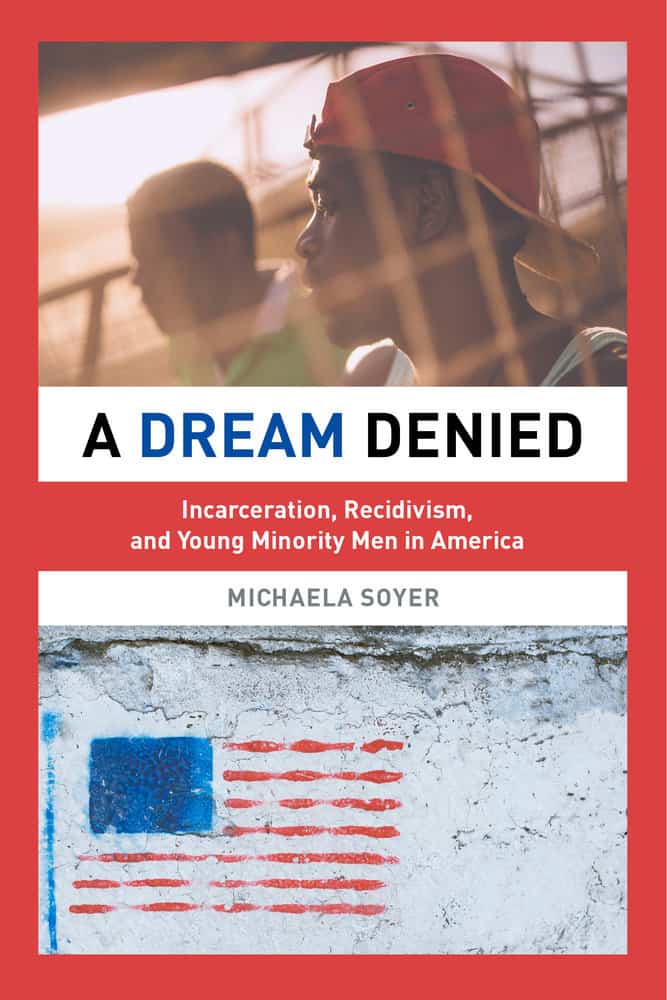This guest post is published around the Academy of Criminal Justice Sciences conference in New Orleans, occurring February 13-17, 2018. #ACJS2018 #ACJS18
By Michela Soyer, author of A Dream Denied: Incarceration, Recidivism, and Young Minority Men in America
 Jason’s case is at the core of A Dream Denied. He was one of the youngest respondents and unlike other youths I interviewed he was always eager to speak with me. Everyone I met that had worked with him in the Department of Youth Services (DYS) believed that Jason was “a good kid”. After I finished my research he and I kept in touch sporadically and remained Facebook friends. When I spoke to his mother right before I handed in the final manuscript of A Dream Denied, she told me that he was doing well, mostly staying out of trouble. I had also noticed in my Facebook feed that Jason was going to be a father. He was so proud that he decided to make the ultrasound picture of his unborn daughter his new background photo. I thought that becoming father could be a turning point for him. He had always enjoyed taking care of children and maybe this new role would give his life the focus he needed.
Jason’s case is at the core of A Dream Denied. He was one of the youngest respondents and unlike other youths I interviewed he was always eager to speak with me. Everyone I met that had worked with him in the Department of Youth Services (DYS) believed that Jason was “a good kid”. After I finished my research he and I kept in touch sporadically and remained Facebook friends. When I spoke to his mother right before I handed in the final manuscript of A Dream Denied, she told me that he was doing well, mostly staying out of trouble. I had also noticed in my Facebook feed that Jason was going to be a father. He was so proud that he decided to make the ultrasound picture of his unborn daughter his new background photo. I thought that becoming father could be a turning point for him. He had always enjoyed taking care of children and maybe this new role would give his life the focus he needed.
… Jason died almost exactly a year ago.
From what I was able to piece together through news items and his Facebook feed, it seemed that the car Jason died in was stolen. His daughter was barely 7 month old when she lost her father.
I expected Jason to struggle. I assumed that he would recidivate, maybe even end up in juvenile prison. In the end however, I wanted to believe that he was going to be ok. When he heard about this death, I realized that even though I titled my book A Dream Denied, I still believed that someone like Jason—a charismatic, energetic, and caring young man—will simply age out of crime and will be able to support himself without dealing drugs or committing robberies. Jason always dreamed big. He wanted to build his own business. Even though he did not know exactly what he wanted to sell, I believed that if anyone could do it, it was Jason who would be able to build a better future for himself. His death is a reminder for myself that even as a qualitative sociologist I am only able to scratch the surface of the extremely complex lives of those I study.
More than other young men I interviewed, Jason struggled with the rigid structure of the Boston Juvenile Justice system. He craved autonomy and I had hoped that once he was able to find a way of expressing himself creatively, he would stabilize his life. Like most of the youths I met during my research for A Dream Denied, Jason was not a hardened criminal. It was easy to imagine that had he grown up under more affluent circumstances, he may simply have struggled with his identity like any teenager. His family would have not had to rely on the juvenile justice system to get social services for their son. Having the financial means to move into a good school district, to pay for engaging after school activities and private counseling services are what separates upper middle class families from Jason’s home. Money cannot insulate anyone from tragedy, yet it affords youths like Jason the opportunity to self-correct without being funneled into the juvenile justice system.
Jason’s death could simply be written off as an individual tragedy. After all, he died in car accident after he had experienced what the press described as a “medical emergency”. Jason’s story however, is more than an individual quest for agency gone wrong. His death signifies that even a fairly well funded juvenile justice system, like the Department of Youth Services in Boston, can only offer temporary solutions to deeply ingrained social problems.
 Michaela Soyer is Assistant Professor in the Department of Sociology at Hunter College.
Michaela Soyer is Assistant Professor in the Department of Sociology at Hunter College.

